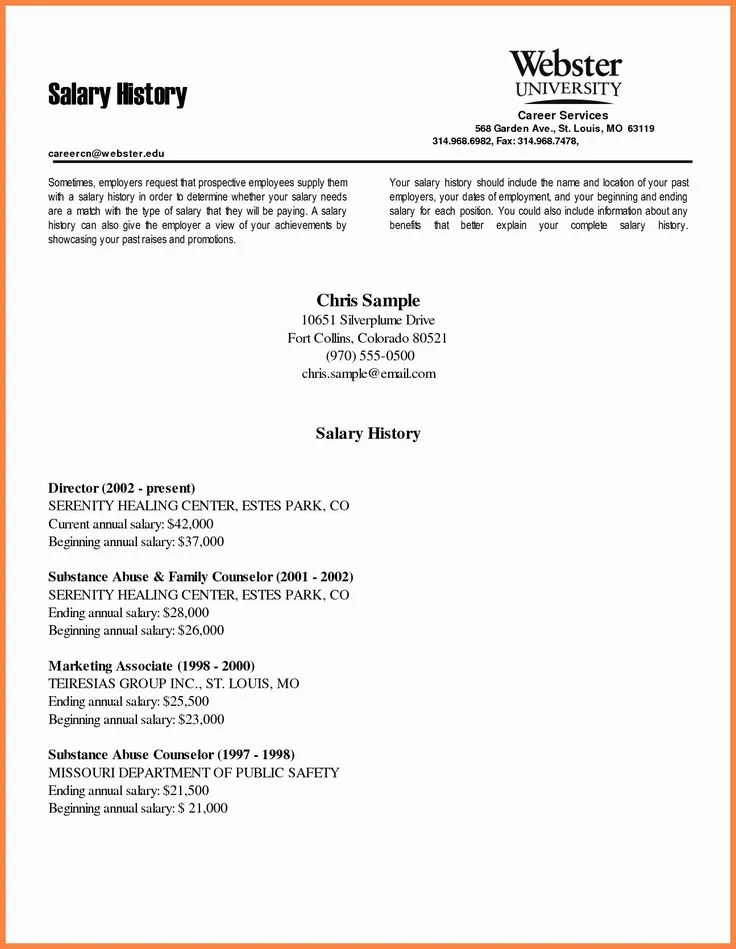Why Include Salary Expectations?
Including salary expectations in your cover letter can be a strategic move, demonstrating your proactive approach and respect for the hiring manager’s time. It allows you to address a crucial aspect of the job early on, potentially streamlining the application process by ensuring both you and the employer are aligned on compensation. By explicitly stating your salary requirements, you can avoid wasting time on interviews for positions that don’t meet your financial needs or expectations. This transparency signals your seriousness about the opportunity and shows you’ve considered your worth in the job market. However, it’s important to understand the nuances of when and how to present this information, tailoring your approach based on the specific job and industry norms. Including a salary expectation helps the employer to ensure their budget aligns with your request. This helps both parties to understand if they are on the same page.
Benefits of Including Salary
Adding your salary expectations has many advantages. Firstly, it saves time for both you and the employer. By stating your desired compensation upfront, you can quickly determine if the role aligns with your financial needs, preventing you from going through lengthy interview processes for jobs that do not meet your requirements. It shows that you’ve researched the market and are realistic about your worth. Moreover, it positions you as a candidate who values their time, demonstrating professionalism and a clear understanding of the hiring process. By being upfront about your expectations, you’re signaling that you’re serious about the opportunity and have considered your overall career goals. This proactive stance can make a positive first impression, particularly in industries where salary is frequently discussed early in the hiring process. Including your expected salary also demonstrates your respect for the employer’s time and resources, signaling your value for the process.
Tailoring Your Approach
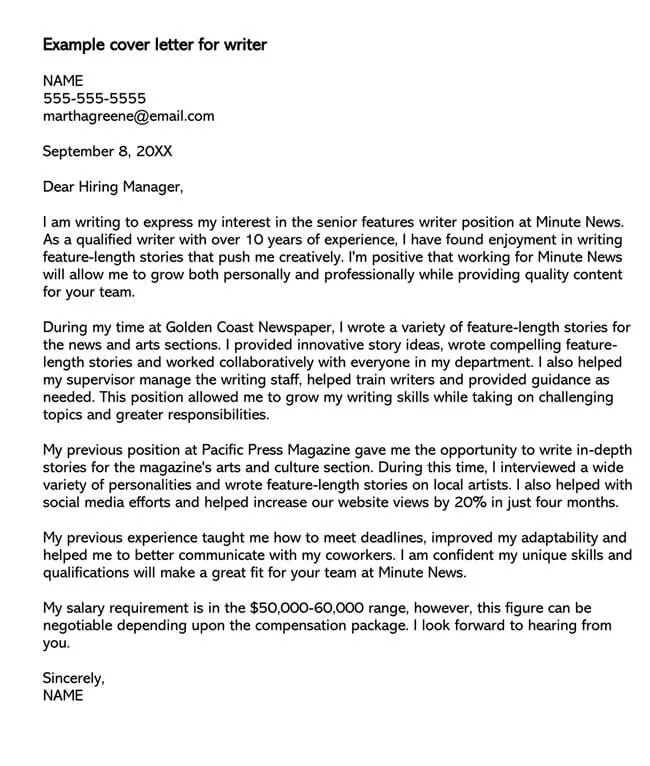
Your approach to including salary expectations in your cover letter should be adaptable. Consider the industry, the specific job, and the company’s culture. Researching the average salary for the role and your experience level is crucial. Be sure to tailor your cover letter according to the job position and requirements, and if the job description specifically requests salary requirements, you should explicitly include them. If the posting doesn’t explicitly ask, you have the option to include it, or you can choose to address the topic during the interview stage. For some roles, particularly those in government or non-profits, salary ranges might be published. When in doubt, consider what your research indicates about the position and what is the industry standard. This way, you can give a good impression to your potential employer.
Researching Salary Ranges
Before mentioning salary requirements, conduct thorough research. Use online tools like Glassdoor, Salary.com, and Payscale to determine the average salary for the role in your location and experience level (salary-research.webp). These websites aggregate salary data based on job title, industry, location, and years of experience, providing a realistic estimate. Consider factors such as company size, benefits offered, and overall financial health of the company. If you have a strong network, reach out to contacts in the field to get an idea of current salary trends. Tailor your research to the specific job requirements and your qualifications. If you have niche skills or extensive experience, you can justify a higher salary. This preparation will enable you to provide a well-informed salary expectation. Be ready to explain the reasoning behind your request during the interview process, and ensure your range is realistic.
Where to Include Salary Expectations
The optimal placement for your salary expectations within a cover letter varies. In some situations, a brief mention in the opening paragraph may be appropriate, especially if the job description specifically requests it (opening-paragraph-cover-letter.webp). However, a more common and strategic approach is to include it towards the end of your letter, after highlighting your qualifications and expressing your interest in the role, but before the closing paragraph. This allows you to position yourself as a strong candidate before addressing compensation. You can also include it in the body of your cover letter, especially when you have a clear understanding of your worth and the salary range of the position. Avoid mentioning salary in the middle of a paragraph, as it can interrupt the flow. The important is to remain professional and polite and to ensure you provide all necessary information.
The Opening Paragraph

If the job posting explicitly requests salary expectations in the cover letter, the opening paragraph is a suitable place to address it. You can briefly state your desired salary or range immediately after expressing your interest in the position. For example, you might write, “I am excited to apply for the Marketing Manager position, as advertised on [Platform]. With my [Number] years of experience and proven track record, I am seeking a salary in the range of $[Amount] to $[Amount].” Keep it concise and professional. This direct approach shows you’ve read the job description carefully and are being upfront about your expectations. Remember, however, that this is not always the best strategy, and your priority should be to highlight your skills and value before discussing salary.
The Body Paragraphs
You can weave your salary expectations into the body of your cover letter, particularly if you want to elaborate on your qualifications and the value you bring to the role. After detailing your skills and experience, you can include a sentence or two about your salary requirements. For example, “Based on my experience in project management, and my demonstrated ability to deliver results within budget, I am seeking a salary between $[Amount] and $[Amount].” This approach links your salary expectations to your qualifications, justifying your request. However, remember to prioritize showcasing your abilities and accomplishments before addressing salary. The body paragraphs are the place to emphasize your fit for the role and why the company should be interested in you.
The Closing Paragraph
If you choose to include your salary expectations in the closing paragraph, it should be done tactfully (closing-paragraph-cover-letter.webp). After reiterating your interest in the position and thanking the hiring manager for their time, you can state your salary requirements. A good example would be, “I am very enthusiastic about the prospect of contributing to your team and believe my skills align well with the requirements of this position. My salary expectations are in the range of $[Amount] to $[Amount]. I look forward to the opportunity to discuss my qualifications further in an interview.” This placement is a suitable way to conclude your cover letter, especially if you have already highlighted your skills and value in the preceding paragraphs. Keep it concise and professional. Be sure to express your enthusiasm for the position and your availability for an interview.
How to Phrase Your Expectations
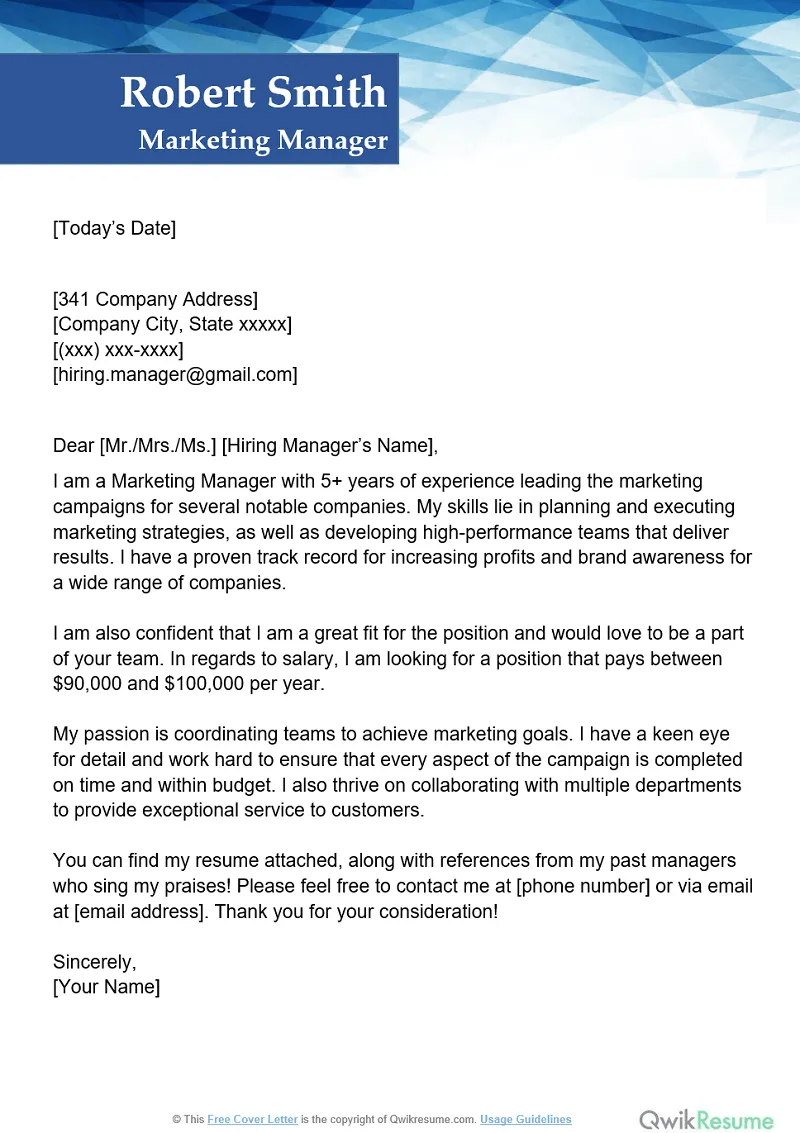
The way you phrase your salary expectations is essential. Instead of stating a fixed number, it’s often advisable to provide a salary range, such as “I am seeking a salary in the range of $[Amount] to $[Amount].” This provides flexibility during negotiations and shows you’re open to discussion. Avoid using overly specific figures, such as “I require $[Amount]” because it can limit your negotiating power. Be confident in your request, but remain open to reasonable adjustments. When stating your expectation, focus on your value. For example, “Based on my experience and the skills I bring to the table, I am looking for a salary between $[Amount] and $[Amount].” This approach links your request to your qualifications. If you’re unsure, you can also state, “My salary expectations are competitive and commensurate with my experience and the responsibilities of the role.”
Using a Salary Range
Offering a salary range is generally the most strategic approach. It shows flexibility and allows for negotiation (salary-range-example.webp). A reasonable range should be within 10-15% of the mid-point. This gives the employer some room to maneuver based on their budget and your qualifications. When stating your range, research the average salary for the position and your experience level to ensure your range is realistic. If you have unique skills or experience that justify a higher salary, you can adjust your range accordingly. Provide a range that reflects your desired compensation while still aligning with the market. This approach allows you to stay in the running for the job while showcasing your professionalism. You will be able to have more control and also show that you value the opportunity.
Avoiding Salary Discussions
In certain situations, it may be best to avoid discussing salary in your cover letter. If the job description explicitly states that salary is negotiable or that the company will discuss it during the interview, it’s usually best to defer the conversation. In these instances, focus on highlighting your qualifications and expressing your interest in the role. Another time to avoid mentioning your salary is if you are unsure about the standard pay scale for that position. You can also refrain from discussing salary if you are applying for a position in a country where salary expectations are typically addressed later in the hiring process. The best choice is to provide your potential employer with relevant information and let them reach out to you. By doing so, you give yourself the best chance for success.
When Not to Include Salary Expectations
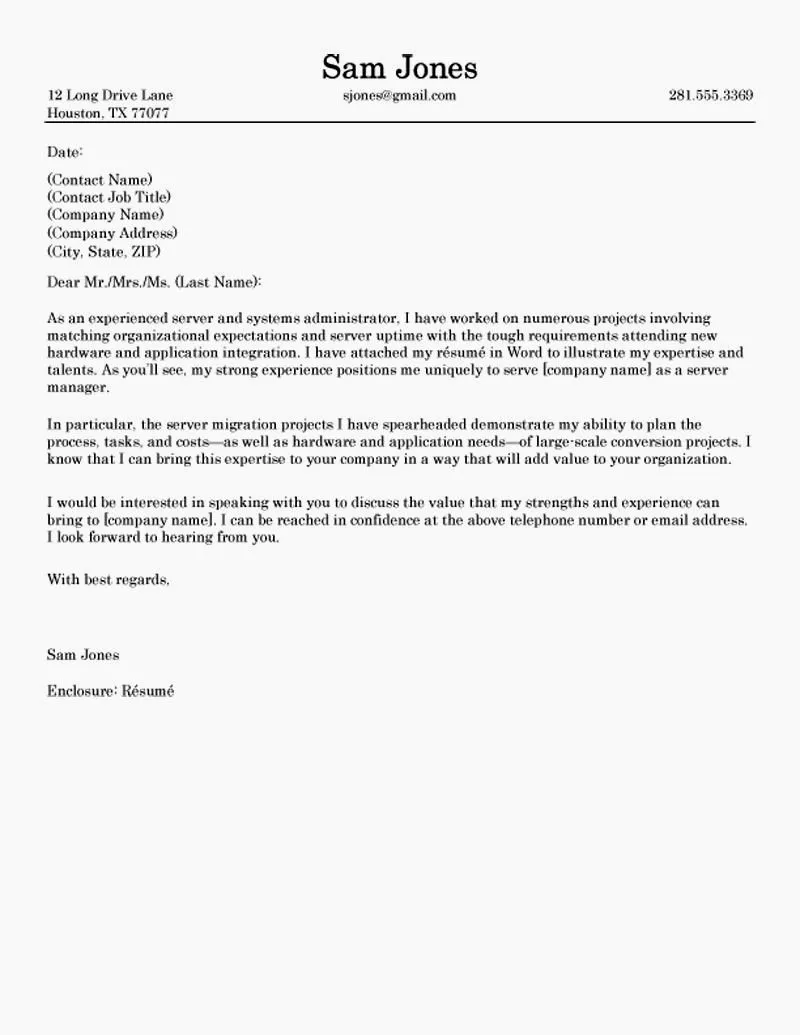
There are situations where it’s better not to include your salary expectations in your cover letter. When a job posting explicitly requests “competitive salary,” it’s often sufficient to state that you are seeking a competitive salary without giving a specific number or range. If you have limited experience and are applying for an entry-level position, it may be more advantageous to focus on your enthusiasm and willingness to learn. Moreover, if you are unsure of the salary range for the position, it’s better to delay discussing it. Avoid providing a salary range if you’re not confident in your research. Lastly, in some industries, it may be considered inappropriate to bring up salary so early in the process. If you are concerned, consult with someone who is an expert in your field.
Cover Letter Examples
To gain a better understanding of how to incorporate salary expectations into your cover letter, consider the following examples (cover-letter-examples.webp).
Example 1 Entry-Level Position
Dear [Hiring Manager Name],
I am writing to express my keen interest in the [Job Title] position advertised on [Platform]. As a recent graduate with a degree in [Your Degree] and a passion for [Industry/Field], I am eager to apply my skills and contribute to your team. Based on my research, I am seeking a salary in the range of $[Amount] to $[Amount], commensurate with an entry-level role. I am enthusiastic about the prospect of learning and growing within your organization and am available for an interview at your earliest convenience.
Sincerely, [Your Name]
Example 2 Mid-Career Professional
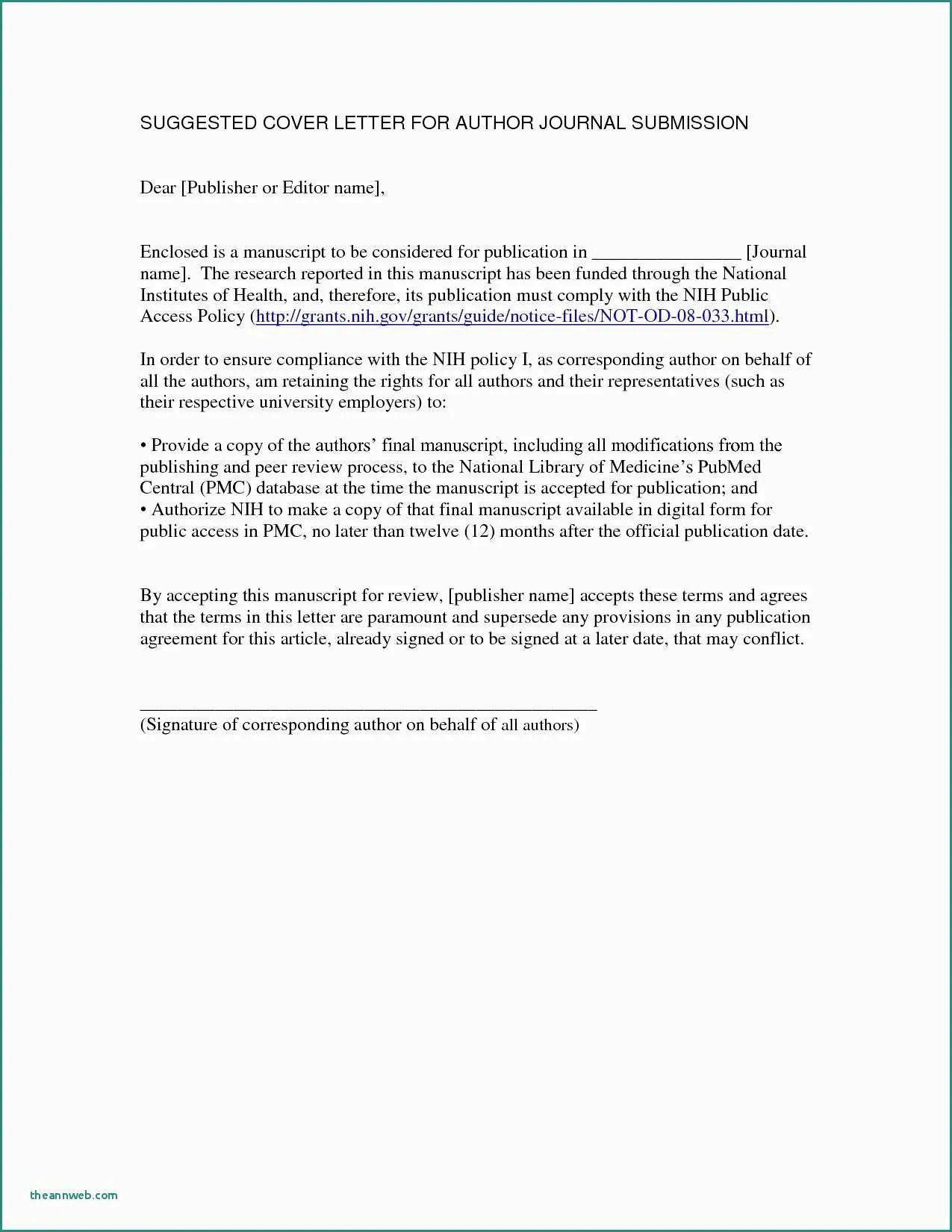
Dear [Hiring Manager Name],
I am writing to express my interest in the [Job Title] position, as advertised on [Platform]. With over [Number] years of experience in [Your Field] and a proven track record of [Achievements], I am confident I can make a significant contribution to your company. Based on my experience, I am targeting a salary between $[Amount] and $[Amount]. I am eager to discuss how my skills and experience can benefit your organization. Thank you for considering my application, and I look forward to hearing from you soon.
Sincerely, [Your Name]
Example 3 Senior-Level Executive
Dear [Hiring Manager Name],
I am writing to express my interest in the [Job Title] position, as advertised on [Platform]. With my extensive experience and leadership in [Your Field], I am well-equipped to successfully perform this role. Given my accomplishments and the scope of responsibilities, my salary expectations are in the range of $[Amount] to $[Amount]. I am excited about the opportunity to discuss how my strategic vision and leadership can contribute to your company’s goals. Thank you for your time and consideration.
Sincerely, [Your Name]
Tips for a Strong Cover Letter
Besides the salary expectations, ensure your cover letter effectively showcases your qualifications (proofread-cover-letter.webp). Proofread meticulously and customize it for each job application. Highlight your relevant skills and achievements, matching them to the job description. Use clear and concise language, and maintain a professional tone throughout. A well-crafted cover letter demonstrates your interest, skills, and professionalism, significantly increasing your chances of securing an interview. Take time to research the company and the role, and tailor your cover letter to their specific needs. By following these tips, you will be able to provide your potential employer with everything they need.
Proofread Carefully
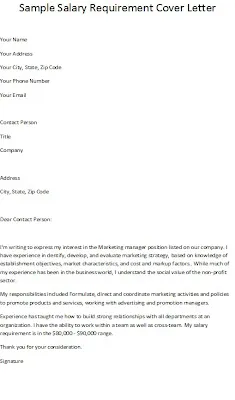
Always proofread your cover letter thoroughly before submitting it. Errors in grammar or spelling can damage your credibility and professionalism. Ensure that your letter is free of typos, and review the formatting to ensure it is easy to read. Proofreading is essential, as it ensures your cover letter reflects your attention to detail and commitment to excellence. Consider having a trusted friend or colleague review your letter for an extra set of eyes. This can help catch any mistakes you may have overlooked. Proofreading also ensures that your salary expectations are accurately stated and that your overall message is clear and professional.
Customize for Each Job
Tailor your cover letter to each job application. Do not use a generic template, as this can give the impression that you are not serious about the position. Customize your cover letter to address the specific requirements and expectations outlined in the job description. This includes highlighting the skills and experiences most relevant to the role and company. Refer to the company’s website, social media, and any additional information to gain a better understanding of their needs and culture. Tailoring your letter shows the hiring manager that you’ve done your homework and are genuinely interested in the opportunity. It also helps demonstrate how your qualifications specifically meet the requirements of the role and why you are a good fit.
Highlight Relevant Skills
Highlight your most relevant skills and experiences in your cover letter, and make sure to match them to the job requirements. This shows the hiring manager that you possess the qualifications necessary to succeed in the role. Review the job description and identify the key skills and experiences they are seeking. Then, provide concrete examples of how you have demonstrated these skills in the past. Quantify your achievements whenever possible. For example, instead of saying “I improved sales,” say “I increased sales by 15% in one quarter.” This not only shows your skills, but also demonstrates your value and accomplishments. By highlighting your relevant skills, you can make a strong case for why you are the right candidate for the job.
